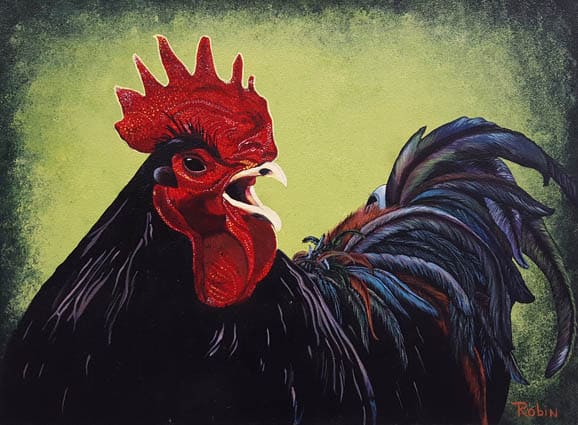By Brett Yates
Since July, the Pittsfield Select Board has endeavored to determine how to respond to a townswoman’s complaints about a noisy rooster on Lower Michigan Road, near the corner of Route 100. At the board’s Oct. 7 meeting, first-time testimony by the bird’s owner appeared to reassure elected officials that a neighborly resolution was near at hand.
Although the complainant, Rebecca Steward, had previously identified local contractor Bill Leimgruber as the rooster’s caretaker, Leimgruber’s wife, Carolynn Stockwell, clarified at the meeting that the bird, called Nixon, belonged to her. Stockwell’s statement before the board rebutted accusations reported in the Sept. 22 edition of the Mountain Times (“Rooster could inspire noise ordinance, professional mediation”). Over the course of four summer meetings, Steward had blamed the rooster for “constant crowing” before dawn and, often, throughout the day. By her account, the animal’s behavior had significantly diminished her quality of life and negatively impacted her husband’s health. By September, the Select Board had promised to bring a potential noise ordinance to the floor as a topic of debate at a future town meeting and to pay for professional mediation between the two households involved in the dispute.
At her Oct. 7 appearance, Stockwell began by noting that she had “intentionally stayed away” from earlier meetings out of concern that her presence would “make things more complicated.” But, “after reviewing the Select Board meeting minutes and having two visits from Select Board members,” she decided that it was “time to meet this head-on,” which she hoped would allow the board to “move on to more important issues.”
According to Stockwell, she had owned Nixon for three years without hearing of any problems prior to a visit from Steward at her home this summer. “I did take her concerns seriously, and that very day, we researched solutions to the early morning crowing issue,” Stockwell recalled. “And that very night, I put our rooster in a pet carrier and I put it to bed in a dark, enclosed outbuilding, and that was done every night until I went out of town a week later.”
During Stockwell’s absence, “the rooster did not get put inside at night for a few days, and understandably this upset Rebecca.” This led to a mutually “unfriendly” encounter between Steward and Leimgruber on the latter’s property.
“We have not been perfect in our noise mitigation efforts,” Stockwell admitted. “There were infrequent nights because of inclement weather where Nixon was not put to bed. But I think things have gotten better and better.”
Stockwell declined the board’s offer of professional mediation, aiming to focus instead on continuing to do “the best we can to mitigate the early morning noise. Nixon will still crow intermittently during the day. I’m hopeful that our efforts have now produced an atmosphere that Rebecca and her husband can live with.”
In her statement, Stockwell took exception to Steward’s diagnosis that Nixon’s crowing owed possibly to unhappiness or mistreatment. “Our chickens are well cared for. Our rooster takes good care of his three hens, Reba, Dolly and Loretta. He is a friendly and non-aggressive rooster, and he often hangs out with us at night in the backyard. He particularly likes to be held and petted by his human family. I hadn’t thought I’d have a rooster as a pet, but that’s what he has become,” she related.
According to Stockwell, Nixon free-ranges during the day. “Many people stop to tell us how pretty our flock is and how much they enjoy their presence in our neighborhood,” she said, pointing out that the next-door neighbors sometimes give the chickens treats when they enter their yard.
For Stockwell and her husband, the sound of a rooster’s crow reminds them “of everything we love about living in the country and in Vermont. But I understand that sounds are subjective and that something that we find enjoyable might not be to someone else,” Stockwell acknowledged.
Stockwell concluded with an overture to Steward: “The seasons are changing, and how we will care for our chickens during the cold weather will change too. So if things are no longer working for [Steward], I encourage her to reach out to me with friendly good intentions. I promise to match those positive intentions and work together. And maybe we’ll even become friends. Wouldn’t that be nice?”
Select Board member Anne Kuendig thanked Stockwell for her visit and waved away an apology. “You have nothing to be sorry for,” she said. “I’m so glad you took this step. We want everyone in our community to work together. Your offer tonight, I think, is going to go a long, long way.”




